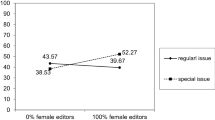Abstract
Three hundred college students (150 female, 150 male) were asked to evaluate an academic article in the field of politics, psychology of women, or education (judged masculine, feminine, and neutral, respectively) that was written by either a male, a female, or an author with a sexually ambiguous name. The results indicated that ratings of the articles were differentially perceived and evaluated according to the name of the author. An article written by a male was valued more positively than if the author was not male. Furthermore, subjects' bias against women was stronger when they believed that sexually neutral authors were female.
Similar content being viewed by others
References
Allport, G. W. The nature of prejudice. Garden City, NY: Doubleday Anchor, 1954.
Baumrind, D. From each according to her ability. School Review, 1972, 80, 1961–1990.
Deaux, K., & Taynor, J. Evaluation of male and female ability: Bias works two ways. Psychological Reports, 1973, 32, 261–262.
Feather, N. T., & Simon, J. G. Reactions to male and female success and failure in sex-linked occupations: Impressions of personality, causal attributions, and perceived likelihood of different consequences. Journal of Personality and Social Psychology, 1975, 1, 20–31.
Feldman-Summers, S. A., & Kiesler, S. B. Those who are number two try harder: The effect of sex on attributions of causality. Journal of Personality and Social Psychology, 1974, 30, 846–855.
Goldberg, P. A. Are women prejudiced against women? Transaction, 1968, 5, 28–30.
Issacs, M. B. Sex-role stereotyping and the evaluation of the performance of women: Changing trends. Psychology of Women Quarterly, 1981, 6, 187–195.
Jacobson, M. B., & Effertz, J. Sex roles and leadership. Perception of the leaders and the led. Organizational Behavior and Human Performance, 1974, 12, 383–396.
Lockheed, M. E., & Hall, K. P. Conceptualizing sex as a status characteristic: Applications to leadership training strategies. The Journal of Social Issues, 1976, 32, 111–124.
Meyer, J., & Sobieszek, B. Effect of a child's sex on adult interpretation of its behavior. Developmental Psychology, 1972, 6, 42–48.
Paludi, M. A., & Bauer, W. D. Goldberg revisited: What's in an author's name? Sex Roles: A Journal of Research, 1983, 3, 387–390.
Panek, P. E., Rush, M. C., & Greenawalt, J. P. Current sex stereotypes of 25 occupations. Psychological Reports, 1977, 40, 212–214.
Pheterson, G. I. Female prejudice against men, Unpublished manuscript, New London: Connecticut College, 1969.
Pheterson, G. I., Kiesler, S. B., & Goldberg, P. A. Evaluation of the performance of women as a function of their sex, achievement, and personal history. Journal of Personality and Social Psychology, 1971, 19, 114–118.
Rosenkrantz, P., Vogel, S., Bee, H., Broverman, I., & Broverman, D. M. Sex-role stereotypes and self-concepts in college students. Journal of Consulting and Clinical Psychology, 1968, 32, 287–295.
Ross, R. T. Optimum orders for the presentation of pairs in the method of paired comparisons. Journal of Educational Psychology, 1934, 25, 375–382.
Taynor, J., & Deaux, K. When women are more deserving than men: Equity, attribution, and perceived sex differences. Journal of Personality and Social Psychology, 1973, 3, 360–367.
Taynor, J., & Deaux, K. Equity and perceived sex differences: Role behavior as defined by the task, the mode, and the actor. Journal of Personality and Social Psychology, 1975, 3, 381–390.
Thurstone, L. L. A law of comparative judgement. Psychological Review, 1927, 34, 273–286.
Ward, C. Prejudice against women: Who, when, and why? Sex Roles, 1981, 7, 163–171.
Author information
Authors and Affiliations
Additional information
We thank Brad Waite for his help in data collection.
Rights and permissions
About this article
Cite this article
Paludi, M.A., Strayer, L.A. What's in an author's name? Differential evaluations of performance as a function of author's name. Sex Roles 12, 353–361 (1985). https://doi.org/10.1007/BF00287601
Issue Date:
DOI: https://doi.org/10.1007/BF00287601




